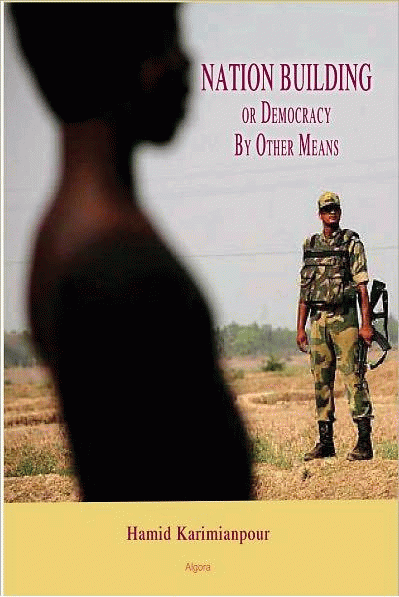The EU and the United States secretary of state, Hillary Clinton, have repeatedly refused talking with Iran about any issues other than the nuclear question. But the Islamic Republic knows that if the US succeeds in pressuring Iran on the nuclear issue, it would be irrational for the US not to use its leverage to pressure Iran on other issues, such as its support for Hezbollah or Hamas. If the West is going to have an agreement that can be used to pressure Iran on other issues in the future, it needs to be prepared to talk about all issues with Iran. Any deal would have to be a comprehensive deal, taking into account all Iran's legitimate national interests and security needs, which will enable and encourage the country to play a more positive role in the region.
The West has insisted numerous times that Iran should halt all enrich  ment activity immediately as a confidence building measure. If the negotia  tions are going to have a chance of producing an agreement, the West too must make a bigger effort to build mutual trust. The so-called all-options-on-the-table or the threat of covert or overt action to topple the regime in Tehran is not exactly a language designed to gain the opponent's trust.
The question that Washington has been grappling with is how to bring Iranians to the negotiation table. President Obama has acknowledged the need for a diplomatic solution to the problem although he has maintained all options on the table. Lessons from Iraq and Afghanistan are finally be  ginning to sink in and the White House is keen to avoid a military confron  tation, at least in the short term. Yet, President Obama's handling of the nuclear situation cannot go without a critique.
As explained in Nation Building or Democracy by Other Means, President Obama extended a hand of friendship to Iran. He addressed Khamenei in writing, made statements about the US--Iranian relations on the US TV, and sent a video New Year message to the Iranian people, but to no avail. The core of President Obama's messages was twofold: firstly, that his administration would accept an Iran elevated to a position of re  gional significance and he would work with Iran to see that happen in a smooth and orderly manner, and secondly, that his administration would not accept a nuclear armed Iran. The fact that the Islamic Republic rejected both calls was a great disappointment for the Administration, but it should have been expected.
When President Bush rejected Khatami's plead for a dialogue among civilizations and opted instead to attack Iran verbally or otherwise, many commentators -- such as Kenneth Pollack -- criticized him for wrecking a golden opportunity for better ties between the two countries. But from Bush's perspective, his approach seemed perfectly reasonable at the time. Iran had been a long-term and unnecessary problem for the US and in the heyday of Iraq and Afghanistan Wars, when the US military appeared to possess unlimited force, the Bush Administration saw an opportunity to root out the Iranian problem once and for all. Iran had been slow to recon  cile with the US even under Khatami. Iranian collaboration with Wash  ington became forthcoming only after 9/11, when the Islamic Republic felt threatened by the presence of US combat forces all around Iran. While in the fifth gear, why should not Bush go all the way to the heart of Tehran? But the plan failed and the Bush Administration was forced to make a humiliat  ing U-turn on Iran. With the U-turn, the table was turned in Iran's favor, and the Islamic Republic could now adopt a similar form of logic as that of the Bush Administration: if the US did not possess unlimited power after all, and if the Islamic Republic had a chance to aim higher and become a regional power, why submit to Obama's plan for Iran? Iran was now in fifth gear. Why should it stop to pick up a hitchhiker from the White House? The Islamic Republic believes or certainly hopes that it can be in power long after President Obama is gone. Who knows if the next US president will honor President Obama's policy vows to Iran? Having burned their fin gers amply before, what guarantees would the Iranian leaders see in taking Obama's hand? History has taught the leaders of Iran to graze as long as the grass is green, as tomorrow may bring the dry season.
Three months after the New Year message, there were some cautious signals that Iran would finally embrace Obama's call for talks and improved relations. Ahmadinejad had prepared a letter to his counterpart in expec  tation of official congratulations from the White House upon his possible reelection to a second term in office. The election was on June 12 th 2009, and Ahmadinejad was declared the winner. The opposition claimed election fraud and demanded a recount. Millions of Iranians took to the streets in major cities to protest. After about one week of peaceful gatherings around the country, the police and vigilante groups cracked down the demonstra  tions violently, killing at least 19 protesters. Ahmadinejad was later sworn in office for a second term. The violent crackdown of demonstrators made it impossible for the Obama Administration to maintain a friendly posture. Once again the US-Iranian relations would take one step forward, but two backwards. Commentators expected Ahmadinejad's letter would contain a reconciliatory language. Many of those who took to the streets opposed Ah  madinejad's uncompromising stance against the West. Some commentators labeled it "the Obama factor." The protestors wanted better relations with the US, but as it is always the case for the Iranian people, they achieved just the opposite of that. This was not President Obama's mistake, nor the mis  take of the demonstrators. The problem was the Iranian election process, which inevitably produced the gridlock. Whether or not the election was rigged, it failed to convince many Iranian electorates that the result was fair.
The biggest mistake of the Obama Administration's handling of the Ira  nian nuclear issue was the adoption of intimidation as a tactic to force the Islamic Republic to the negotiation table. The P5+1 -- the permanent mem  bers of the UN Security Council and Germany -- devised a new prolifera  tion-proof proposal for Iran, giving the country only 2 days to respond. On whatever advice President Obama agreed to adopt the two day notice, this was a categorically bad idea, given Iran's proven hard line in the negotia  tion. It was as if President Obama was asking for the proposal to be rejected. Every single move Ahmadinejad had made ever since coming to power had reaffirmed that his government would not budge under pressure, not even under the threat of imminent invasion; in fact, the adrenaline rush would make him even more obstinate. Why would President Obama push so hard, when there was so much evidence that it would make even harder for the proposal to be accepted? Did President Obama really think that Ahmadine  jad had suddenly changed, or was the two day notice rather designed to boost Obama's domestic image as a tough president? Whatever consid  erations went through the corridors of White House, one thing remained clear: the harder Obama pushed on the issue, the more determined Tehran became in opposing the president, and the more America looked helpless.
Whether or not the real intention behind the nuclear scheme is the de  velopment of WMD, the program is the most important national security issue for Iran at the moment -- far greater in significance than, for instance, the healthcare or financial overhaul bill for the United States -- and Presi  dent Obama was giving Iran only 2 days to make a decision.
(Note: You can view every article as one long page if you sign up as an Advocate Member, or higher).






